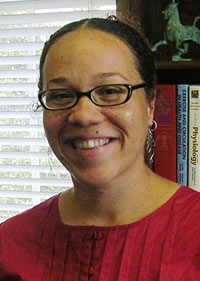UC Berkeley Press Release
African diaspora graduates in hot demand
BERKELEY – Graduates of the University of California, Berkeley's decade-old African Diaspora Studies Program have begun a diaspora of their own, landing plum academic appointments across the country from the University of Hawaii to Michigan's Wayne State University and beyond.
This Thursday (Nov. 1), some of them will return to their academic homeland to discuss their research and share their success stories. The daylong UC Berkeley conference will mark the 10th anniversary of the program, founded in 1997 as the nation's first doctorate program in this field. As part of the celebration, activist and playwright Amiri Baraka will read poetry.
 Elisa Joy White |
Rather than focus on African American history and culture, the program examines the influence of African cultures in the Caribbean, South America and Europe, among other parts of the world. Since the campus's Department of African American Studies launched the program, each of the 12 graduates has landed either a tenure-track faculty position or post-doctoral fellowship at a respected university.
What makes them such hot property?
"Universities want to expose their students to scholars who are able to cross disciplinary boundaries to get at important historical and contemporary questions. They know that we represent the future of academia," said Elisa Joy White, who received her Ph.D. from UC Berkeley in 2002.
Indeed, White, an assistant professor of ethnic studies at the University of Hawaii, Manoa, who will attend Thursday's conference in Barrows Hall, has become a prominent voice in such emerging fields as black European studies and global black communities in cyberspace.
White started out in the African Diaspora Studies Program looking into relations between African Americans and Irish Americans in 19th century New York, but then got interested in how blacks were faring in contemporary Ireland, where the economy has been booming due to globalization and the country's computer technology industry.
White said she began by sending out queries to various scholars around the world asking, "Are there blacks in Ireland?" Ultimately, she received statistical data from another UC Berkeley graduate student confirming that work permits had been issued to blacks in Ireland. She then traveled to Ireland to see firsthand how blacks had integrated in the country.
She found that Ireland's economic boom had, in fact, drawn immigrants from Africa, mostly from Nigeria and the Congo, but that the newcomers were not necessarily welcome in the Emerald Isle, despite a "national narrative that professes the contrary," White said.
That led White to a Fulbright grant and a dissertation on the topic. "The work I was doing in the program and the support of various faculty members really made it possible to conduct research on a very rich subject that many thought inconceivable," White said.
African American studies at UC Berkeley has come a long way since 1970, when it was just a unit with six faculty members, most of whom were part-timers, within the newly-formed ethnic studies department. It officially joined the College of Letters & Science in 1974 with an emphasis on activism and community involvement.
Today, the Department of African American Studies is thriving with 20 majors, 60 minors and 11 full-time faculty members. And the African Diaspora Studies Program is unmistakably a jewel in the department's crown.
"Our graduates, who are currently assistant professors and post-doctoral fellows, are a living example of the program's rich intellectual goals," said Ula Taylor, chair of the African American studies department.
Indeed, the multinational, interdisciplinary nature of the African Diaspora Studies Program has been a bonus on many a resume.
"I remember being told that I might struggle to find a job with a degree in African diaspora studies because it was not a traditional discipline," said Xavier Livermon, who landed a postdoctoral fellowship in communications at the University of North Carolina after graduating from the UC Berkeley program last year and is headed for a tenure track faculty position at Wayne State University in Detroit.
Livermon wrote his Ph.D. dissertation on South Africa's popular music and performance art's influence on socio-cultural change in the country.
 Marisa Fuentes |
He said he was drawn to African diaspora studies because it crossed so many boundaries, and that excited him: "It seemed like the scholars in the program were breaking down both the barriers of traditional disciplines as well as geographic barriers, and I wanted to be a part of that," Livermon said.
Like Livermon, Marisa Fuentes is also a post-doctoral fellow at the University of North Carolina-Chapel Hill. She graduated from the UC Berkeley program in July. Fuentes was a history major at UC Santa Cruz when she became intrigued with West Africa as the ancestral homeland of many southern blacks.
As an undergraduate junior, she traveled to Ghana as part of her research into the history of slavery. She continued this exploration in her graduate work at UC Berkeley. Now, as a post-doctoral fellow, she is looking into the issues of power, race, gender and sexuality pertaining to enslaved women in 18th century Charleston, South Carolina, and in Bridgetown, Barbados - both Atlantic port cities.
Her research has brought her to Barbados, Britain and South Carolina, and taught her that although people of African ancestry throughout the world share experiences of racism, sexism and classism, "there are conditions that make our experiences vastly diverse and unique," she said.
For these and other African diaspora studies graduates, returning to UC Berkeley this week will be a welcome homecoming.
"Probably the best part is being able to reflect on the more challenging moments of my own experience and to tell new cohorts that if they stick with it, the program will lead to some amazing opportunities within and beyond academia," White said.
Said Livermon: "It feels great to be coming back."

